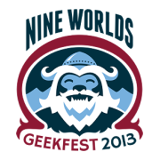
As a writer, and moreover a writer whose work crosses more than one genre, it's great to be invited to an event which encompasses all kinds of media, not just books but film, TV, graphic novels, games and art - something that wouldn't necessarily have happened even when I first began writing eight years ago. Really, it shows the exciting new ways people are finding to create networks and conversations around the topics that inspire them. To give you an idea of how inclusive the event is, this is what the organisers say:
'...while there'll be lots of sci-fi/fantasy TV/film & lit stuff going on at Nine Worlds, there'll be even more other stuff like science and creative writing and filmmaking, that have no direct link to sci-fi (other than a degree of overlap in fan bases). We're really looking to make Nine Worlds about fan-led events, and having conversations with creators.'
Nine Worlds are also donating all the profits from the convention to English PEN, a great organisation which works to defend the right to freedom of expression for writers and readers around the world - and one of the best global communities that you can be part of as a writer. So all in all, a good thing!
I've been thinking quite a bit about genre recently. I'm often asked what genre my books fit into, and sometimes I struggle to give a precise answer. Readers are faced with a sometimes bewildering map of genres and subgenres that are used nowadays to categorise books. Perhaps we should just affirm, as Matt Haig does in this excellent and intriguing chapter from his new book, The Humans: 'There is only one genre in fiction. That genre is called "book".'
The problem is, genres aren't really for writers. There would be something wrong with me staking a claim to a particular genre before my books were even completed. The best piece of writing advice that I've ever been given was a variation of this, from Toni Morrison: '“If there's a book that you want to read, but it hasn't been written yet, then you must write it.” This is the way I approach my writing - in the midst of all the books which are published each year, the only way in which a writer can claim to be creating something original is to write without imitating, instead trying to trace the threads of a story which feels eerily like it's 'out there' somewhere: a particular character or mood or scene that catches your attention. It's very unlikely that this story will come with its genre attached. In fact, I believe that each book has its own particular mood or tone, a kind of atmosphere which may not map neatly onto a particular genre or style of story, unless you're someone who intentionally apprentices themselves to one particular tradition. Great books, like The Catcher in the Rye, can have the strongest identity in the world precisely by standing on their own, by entering a dialogue with the writers who have gone before without becoming swallowed by all the other voices out there. They simply define their own genre or stretch its boundaries, lighting the way ahead of them as they go.
But this is not to say that genre is unhelpful. Once a book is published, I believe very firmly that it becomes the democratic property of its readers, so I certainly don't have a problem with other people speculating about the different genres which overlap in my writing. This can only be a good thing if it helps readers make sense of the way in which the book has spoken to them, and say something meaningful about its particular mood or atmosphere, and the connections it might have with the other books out there. I've been told over the years that my books are realism, gritty realism, fantasy, science fiction, dystopian fiction, family drama, magical realism, young adult 'issue' fiction, literary fiction, young adult literary fiction - and all kinds of combinations of these! None of these opinions are wrong, just different ways of seeing the stories. If it helps, I see my own books as mostly realist in tone, driven by character rather than plot, and dealing with themes that mostly relate to human relationships, but with elements of magic and science fiction as part of their particular atmosphere and mood. But each book finds a slightly different place in the vast community of voices already out there. And meanwhile, I'm more than happy for you to define my writing however you like!
 RSS Feed
RSS Feed
